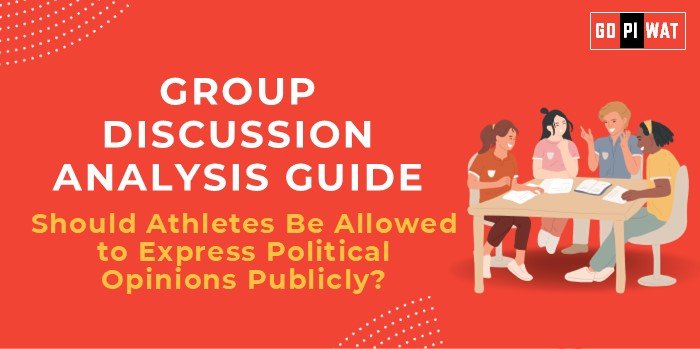📋 Group Discussion Analysis Guide
🏅 Should Athletes Be Allowed to Express Political Opinions Publicly?
🌟 Introduction to the Topic
In the age of global connectivity, sports have transcended athleticism to become platforms for cultural and political discourse. Athletes like Colin Kaepernick and Megan Rapinoe have sparked debates by publicly expressing their political views.
The debate around athletes’ rights to political expression highlights tensions between free speech and maintaining neutrality in sports. With increased visibility, athletes are uniquely positioned to influence public opinion, raising questions about the role of politics in sports.
📊 Quick Facts and Key Statistics
- Global Reach: FIFA 2022 World Cup attracted over 5 billion viewers, demonstrating sports’ extensive audience influence.
- Notable Incidents: Colin Kaepernick’s 2016 NFL protest caused a 20% decline in NFL viewership that season.
- Olympic Guidelines: Rule 50 of the Olympic Charter prohibits political protests during events.
- Athlete Activism: 60% of global sports fans support athletes taking political stands (2023 Nielsen survey).
🤝 Stakeholders and Their Roles
- Athletes: Exercise free speech to raise awareness on critical issues.
- Sports Organizations: Balance inclusivity and neutrality to protect the integrity of events.
- Fans: Influence the perception of political activism in sports.
- Governments and Advocacy Groups: Partner with athletes to amplify messages or discourage politicization.
🏆 Achievements and Challenges
✔️ Achievements
- Social Awareness: Kaepernick’s protest sparked widespread discussions on racial injustice in the U.S.
- Global Movements: Megan Rapinoe’s activism influenced discussions on gender pay equity.
- Policy Changes: FIFA now permits armbands supporting human rights causes, showcasing flexibility.
- Increased Fan Engagement: Activism often garners more interest and engagement in sports.
⚠️ Challenges
- Viewership Declines: Political gestures risk alienating fans with opposing views.
- Polarization: Activism can deepen divisions among stakeholders in sports.
- Athlete Risks: Public backlash and loss of sponsorships.
- Global Comparisons: U.S. leagues (e.g., NFL) often tolerate political expressions, unlike the Olympics or FIFA, which enforce stricter rules.
🧠 Structured Arguments for Discussion
- Supporting Stance: “Athletes are influential voices capable of driving meaningful societal change, leveraging their platforms to advocate for justice and equity.”
- Opposing Stance: “Sports should remain neutral to avoid alienating fans and distracting from athletic excellence.”
- Balanced Perspective: “While athletes have the right to express opinions, timing and context are crucial to maintain sportsmanship.”
📢 Effective Discussion Approaches
- Opening Approaches:
- “Sports are more than entertainment; they are platforms for shaping global discourse.”
- “Athletes, like citizens, should not be stripped of their rights to free expression.”
- Counter-Argument Handling:
- Acknowledge concerns about neutrality but emphasize the positive societal changes prompted by athlete activism.
🔍 Strategic Analysis: SWOT Framework
- Strengths: Global platforms for visibility; potential for positive societal impact.
- Weaknesses: Risk of backlash, sponsorship losses.
- Opportunities: Partnerships with NGOs; broader audience reach.
- Threats: Regulatory backlash, audience polarization.
🎓 Connecting with B-School Applications
- Real-World Applications: Case studies on managing public relations during controversies.
- Sample Questions:
- “How should organizations address athlete activism?”
- “Discuss the economic impact of political activism on sports.”
- Insights for Students: Explore the intersectionality between sports, media, and socio-political trends.


